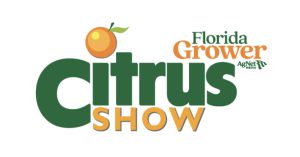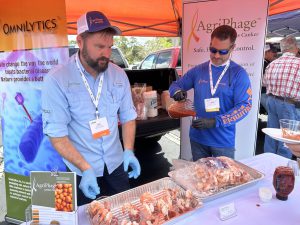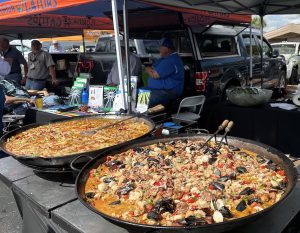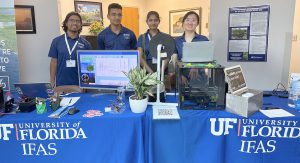 Record attendance, a festival-like vibe, and an inventive menu of freshly prepared tailgate-style foods regaled 2023 Florida Citrus Show attendees on April 13.
Record attendance, a festival-like vibe, and an inventive menu of freshly prepared tailgate-style foods regaled 2023 Florida Citrus Show attendees on April 13.
“The 2023 Florida Citrus Show was an extraordinary success. Under perfect skies, a record attendance turned out to enjoy a rousing tailgate trade show with delicious food offerings from each vendor. The presentations were informative and well-attended. The positive comments keep rolling in,” said Ronald D. Cave, UF/IFAS Indian River Research and Education Center (IRREC) Director.
“AgNet Media, the UF/IFAS-IRREC, the Indian River Citrus League, and the United States Department of Agriculture Agricultural Research Service Horticultural Research Laboratory planned an exemplary event for all in attendance,” Cave said.
According to officials with AgNet Media, more than 700 attended The Florida Citrus Show (FCS). And while most visitors hailed from Florida, about 12 registrants reside in California and Georgia. The show attracted four internationals: one from Angola, others from Japan, Ireland, and Brazil.
The FCS tradition is a focus on citrus production. And with Florida’s diverse offerings of high-value specialty crops, show leaders added vegetable educational sessions to this year’s line-up.
Vegetable production topics included pest management for nematodes, area-wide whitefly management, and a new invasive species—Thrips parvispinus.
Scott Adkins, plant pathologist with the United States Department of Agriculture Agricultural Research Service Horticultural Research Laboratory (USDA-ARS), presented a live demonstration with canines that successfully identified virus-infected plants by smell. Adkins’ presentation, “What’s new in vegetable viruses and detector dogs,” provides producers with a method to detect and curtail plant disease in commercial production operations.

Tailgate-Style Luncheon
Just before noon, aromas of meats sizzling on barbeque grills, stewing seafood dishes, and simmering swamp cabbage swirled about the tented trade show. OmniLytics associates prepared succulent, farm-raised pink shrimp cocktails in clear, martini-size holders. From the many sumptuous tapas, show attendees selected Southern Citrus Nurseries’ vegetable spring rolls for the top tail-gate cuisine offering. But the entire lunch innovation was a success, said Cave.

UF/IFAS-IRREC Professors led educational sessions
UF/IFAS IRREC professors Mark Ritenour and Sandra Guzmán organized the show’s Citrus Section Educational Sessions.
“We enjoyed the opportunity to showcase the tireless work of UF/IFAS researchers and extension programs in supporting Florida’s signature crop,” Guzmán said.
Inside the IRREC rotunda, Guzmán’s team from the Smart Irrigation and Hydrology Laboratory presented demonstrations on sensors for water and nutrient management, salinity, and artificial intelligence. Outside IRREC, her team showcased their progress on nano-bubbles technology for water farm (or dispersed water management) operations.

High attendance at educational sessions
Citrus sessions were delivered in the IRREC Auditorium. Growers and researchers gained new information to manage production, disease, pests, and the latest technologies in agricultural operations.
New citrus nutritional guidelines
Researcher and Professor Kelly Morgan presented UF/IFAS’s recent citrus nutritional guidelines updates, including specific amounts for increased foliar manganese and zinc applications. Morgan also mentioned there are more upcoming updates.
Symbionts to treat HLB-affected citrus
Attendees noted a talk involving symbionts to treat citrus trees infected with HLB. Michelle Heck, a USDA-ARS molecular biologist, presented her work with symbionts. Specifically, Heck injects live beneficial organisms into experimental trees to develop symbiotic relationships inside the tree that will support the plant’s health so that it tolerates HLB. While the symbionts are genetically engineered, the tree is not. Heck said greenhouse studies with symbionts are positive. Plans are to take the treatments to the field for trials.
New citrus varieties are a popular subject at the FCS each year. Presenting on the topic were USDA-ARS researchers Kim Bowman, Anne Plotto, and Matt Mattia. From UF/IFAS, plant breeder and professor Jude Grosser highlighted his work with UF-1859, a sweet-orange hybrid, and C2-5-3, a grapefruit-like hybrid. Grosser said UF-1859 has good HLB tolerance and high sugar content. The C2-5-3, a new variety for the fresh fruit market, tolerates both citrus canker and HLB.
Early findings from The Millennium Block
UF/IFAS-IRREC Professor Mark Ritenour presented the final citrus educational session on two active citrus variety experiments, the IRREC Millennium Block and the Multi-Agency Collaborative, known as the MAC Project. Ritenour said that the MAC Project’s early data shows ‘Star Ruby’ may be eliminated from future trials.
Ritenour concluded his talk with a reminder that two severe weather events impacted both experiments. As a result of strong winds, fruit drop was an issue, and a full harvest was not possible. Reliable data from the two experiments will require three more seasons, so that the researchers may make good recommendations on the new citrus varieties.
Looking forward to 2024 Florida Citrus Show
Ritenour said, “Dr. Guzmán and I look forward to partnering with AgNet Media, the USDA-ARS Horticultural Research Laboratory, and the Indian River Citrus League to build on this year’s successful Florida Citrus Show to provide an even better Show for 2024!”
Growers and those interested in seeing a partial list of presentations made at the 2023 Florida Citrus Show may access them at this link.
 10
10
